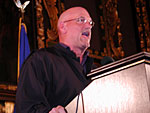By Tom Scheck
Minnesota Public Radio
May 19, 2002
The Minnesota Legislature voted late Saturday night to override Gov. Ventura's veto of a budget bill. The bill erases the state's remaining $439 million projected deficit, but Gov. Ventura says lawmakers took the easy way out. While legislators overrode the budget veto in quick order, they struggled to agree on an anti-terrorism bill.
| |
|
|
|
||
With little debate in both chambers, the House voted 95-38 and the Senate voted 53-14 to override Gov. Ventura's veto of the budget bill. The bill completes the second portion of addressing a projected deficit of about $2.4 billion. Republican House Speaker Steve Sviggum of Kenyon says Gov. Ventura decided early in the session that he didn't want to be a player in budget negotiations, so lawmakers balanced the budget without him.
"We went ahead and did the work and did the job without him. I think that we probably set better priorities than Gov. Ventura was going to set. And while the bill's were not certainly anything to write home about - they weren't great bills because the choices were between bad and worse - I think the governor's choices would have been the worse," Sviggum said.
Lawmakers used a mix of one-time money, spending cuts, and accounting shifts. They didn't raise taxes. Ventura's budget plan included tax increases, spending cuts and use of the budget reserves. The governor says he vetoed both budget balancing bills because they didn't address the state's deficit over the long term. Ventura says lawmakers used gimmicks in phase two of balancing the budget.
"I was very clear all through the session of what a bill would take to get my fingerprints on it. That it would have to be fiscally responsible that there be no gimmicks, no shifts and instead it turned out to be the opposite. It's all gimmicks and shifts, and so I want it clear that this wasn't part of my solution in any way, shape of form," Ventura said.
Ventura said lawmakers have left next year's Legislature with some heavy lifting as they grapple with the ongoing hole in the state budget. DFL Assistant Senate Majority Leader John Hottinger of Mankato says the bill isn't perfect, but is the best of a bad situation. Hottinger says working in a tri-partisan system can cause legislative gridlock. He says lawmakers will need to raise taxes when they return next year.
"It's going to be very, very hard for us to balance a $2 billion budget next year without looking at tax increases when already education is being underfunded if you look at virtually every school district in the state," according to Hottinger.
While lawmakers were quick to override Ventura's veto, they negotiated throughout the night to complete an anti-terrorism bill. The House and Senate were divided over a House Republican proposal to require that state driver's licenses identify immigrants. The requirement would also tie the expiration dates on the driver's licenses to an immigrant's visa.
Rep. Rich Stanek, R-Maple Grove, says negotiators agreed on a pared-down version that primarily includes funding for training and equipment for law enforcement. Stanek says the Legislature failed by not doing more for the state's emergency readiness.
"It's ironic that Sept. 11 came. A big tragedy. We came into the session in late January and had agreed in the House and Senate now here we are on the last day of what could be of the 2002 legislative session at 1:20 in the morning and it's probably going to be the last bill the passes off the floor. Something is wrong with that," Stanek said.
Senate DFLers say they're pleased that they protected civil rights for the state's immigrants by defeating the driver's license provision. Department of Public Safety Commissioner Charlie Weaver says he will see if he can make modifications to the state's driver's licenses through rulemaking authority.
More from MPR
